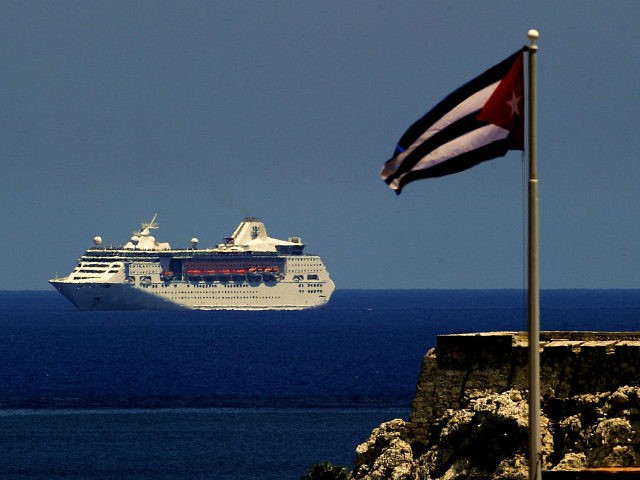As many as 800,000 Americans have purchased tickets to travel via cruise ship from the United States to Cuba, a practice the Trump administration banned Tuesday, likely keeping their money out of the hands of the repressive Castro regime.
In a joint report, USA Today and the Associated Press cited Cruise Lines International Association, an industry organization. It noted that some of the largest cruise corporations affected, like Carnival Cruises, are in the process of notifying would-be passengers that their voyages will no longer occur.
“For the Cuban government, cruise travel generated many millions of dollars a year in docking fees and payments for on-shore excursions, although those figures were never made public,” the report noted. The Castro regime generates its funds first and foremost to maintain the extremely expensive lifestyles of the Castro family. It also spends significant amounts on controlling the repressive intelligence apparatus in Venezuela and in the imprisonment and torture of dissidents at home.
“Veiled tourism has served to line the pockets of the Cuban military, the very same people supporting Nicolás Maduro in Venezuela and repressing the Cuban people on the island,” the U.S. State Department explained in a statement Tuesday on the new policy. “The United States calls on the regime to abandon its repression of Cubans, cease its interference in Venezuela, and work toward building a stable, prosperous, and free country for the Cuban people.”
The policy also bans most private aircraft as well as yachts and other marine vessels.
President Barack Obama began implementing policies in 2014 to establish friendly relations with the communist regime on the island, reopening the U.S. embassy on the island and allowing corporations to engage in business with regime-owned hospitality companies despite the longtime embargo on the country — and the even stricter embargo Cuba places on its citizens, banning them from nearly all unsupervised interactions with Americans.
In 2016, the powerful corporate interests in the cruise line industry acquired permission to add trips from the United States to Cuba to their offerings. The Carnival Cruises ship Adonia became the first American ship to dock in a Cuban port that year since the 1959 communist revolution.
Prior to 2016, Cuba banned all American ships from docking on the island, a policy enforced following the 1961 Bay of Pigs liberation operation in which President John F. Kennedy chose to abandon Cuban patriots attempting to liberate the island and trigger a massacre of over 100 people, including non-ethnically Cuban Americans.
To travel to Cuba, companies like Carnival had to agree to use the ports of Havana and Santiago de Cuba, which the Castro regime robbed from American citizens during the Revolution using state force. In May, President Donald Trump allowed the original owners of property in Cuba to sue private corporations that use their stolen property for illicit trafficking. Carnival is currently embroiled in a lawsuit for its use of the ports, the first company to be sued under the now-active Title III of the 1996 Libertad Act.
While the lawsuits may have made it no longer profitable to travel to Cuba, anyway, the Trump administration announced Tuesday that it would end “people-to-people educational” trips to the country. The Obama administration created this exception to the embargo to allow for tourism on the island through specialized companies. To qualify, the companies offering the trips had to put together time-specific itineraries for every passenger including some artistic, scientific, or academic events.
The Trump administration said the policy would go into effect June 5, with the exception of individuals who had already taken material steps to make the voyage, including those who had purchased tickets for cruises. A spokesman for Carnival Corporation told USA Today, however, that the company is ending the trips “effective immediately.”
Other cruise companies, like Norwegian and Royal Caribbean, offered at press time statements that they were still processing the change in policy and did not yet have a definitive plan forward.
USA Today notes that Virgin Voyages, which was set to debut their trips to Cuba with a lavish 70th birthday soiree for owner Richard Branson, will likely no longer be able to make that voyage. A spokesperson told the outlet, “the beauty of sea travel is that we have the flexibility to adjust our itineraries if needed,” suggesting the birthday party may occur, just not concluding with docking in Cuba.
The Cuban regime has responded with its typical vitriol to the new policy.
“The aggression of the Trump administration against our country appears endless,” the official newspaper of the Cuban Communist Party, Granma, declared in a column Tuesday. Calling the United States “the country that believes itself protector of democracy and defender of human rights,” Granma warned the U.S. that “the example of Cuba before the world” as a repressive dictatorship that has consistently antagonized it for 60 years should “concern” Washington.

COMMENTS
Please let us know if you're having issues with commenting.